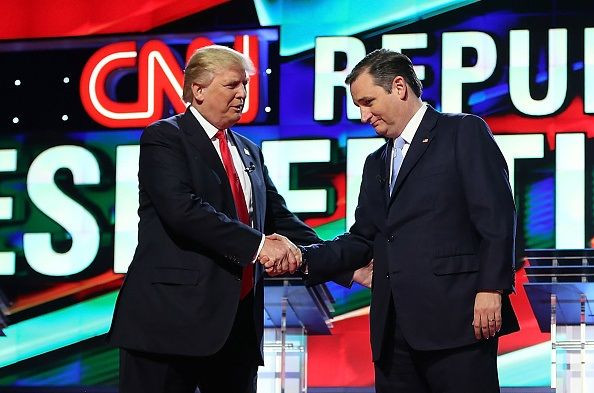Trump 2.0: Don’t Be Fooled By His ‘Low Energy’ — He Is Still Playing The Media

At the Republican presidential debate in Detroit on March 3, Sen. Ted Cruz ordered Donald Trump to calm down and stop interrupting him, asking him to “breathe, just breathe.” On Thursday, at the Republican debate in Florida, Trump breathed.
It’s something new for him. After months of bombastic debate performances, climaxing in last week’s Fox News thriller where he bragged about his junk and referred to the folk duo of “Lyin’ Ted and Little Marco,” the GOP front-runner is toning things down.
To the surprise of viewers and journalists, the most recent debate lacked the zingers, hecklers and downright nastiness of previous outings. CNN didn’t pay much for that, raking in about 12 million viewers, according to Nielsen, a number that would be a good night on CBS.
Don’t assume that means it was a productive evening: The event was not particularly heavy on policy or substance — the candidates openly mocked climate change, prescribed a permanent global war, and in the case of Trump, smeared the entire religion of Islam. The difference was simply that most of their boilerplate tirades were delivered calmly and without many personal insults.
In other words, everyone got to meet the “presidential” version of Donald Trump.
It would be tempting to give credit to moderator Jake Tapper and the producers at CNN, but it was clear that the change in tone, like so much of this election, was the front-runner’s call. If he wanted to, he could've turned the whole thing into a brawl the way he always has.
"I cannot believe how civil it's been up here," Trump said with an encouraging smile early on in the debate. It came across as messaging — that he can play nice with the other candidates, and if they know what’s good for them they should play right along.
It’s a new side of Trump that’s no less manipulative than his previous incarnations, the most boisterous of which people saw on Tuesday night after he claimed several more primary victories.
In what was widely described as an “infomercial,” Trump blathered for about 50 minutes, a little bit of this, a little bit of that. He boasted about his polling, he plugged his vodka brand, his country club magazine and his defunct line of Trump steaks.
None of it was really news, especially considering that meanwhile Hillary Clinton was delivering a concession speech after losing Michigan to Sen. Bernie Sanders in a nail-biting primary upset.
Yet the cable channels stayed on Trump, right until the last steak had been hocked. With ratings like that, it's a good bit of business for them. (MSNBC would go back and play Clinton’s address later.) Outrage was palpable on social media from journalists and viewers alike. But around 4.2 million viewers tuned in to Fox and almost 3 million viewers were glued to CNN, according to Nielsen. Whether the genuine political drama unfolding in Michigan would have drawn more eyeballs, we'll never know.
“CNN has always received criticism for round-the-clock coverage, like the O.J. Simpson trial or JFK Jr.’s plane going down, despite not much return on that coverage," said former CNN Washington bureau chief Frank Sesno, who’s now director of the School of Media and Public Affairs at George Washington University.
“But I cannot recall anything like this."
The networks, he said, are simply trying to navigate the new terrain that Trump has laid out this season.
“The thing that’s so challenging for news organizations trying to make these decisions in real time is that you don’t know whether he’s gonna say something new and outrageous, or just the same as usual,” Sesno said. “He’s so unpredictable, there’s no way of knowing.”
Of course, there’s no equal time doctrine anymore, not on cable. So organizations have to decide their role in dealing with a field where one candidate can dominate the airwaves with free media and sheer personality. That means deciding whether the media should be an arbiter of airtime.
“It’s not really up to the news organizations to level the field; it’s up to the candidates to do that,” Sesno said. “But no, not every word he utters is newsworthy -- quite the contrary. I hope that talk radio and talk television don’t take free media and discount it further. We should be in the business of informing and engaging the public."
“That means you don’t just turn your airwaves over to him,” he added. “It should not be a blank check.”
The lightning-fast shift in Trump’s demeanor — salesman on Tuesday, statesman on Thursday— suggests he may be developing an even more sophisticated grasp on how to play to different audiences and manipulate the media as the general election draws near.
Of course, it’s always possible he lacks the patience to keep the act going.
“I think we’ve had enough debates,” he told the Washington Post after Thursday’s event. “How many times do you have to give the same answer to the same questions?”
© Copyright IBTimes 2024. All rights reserved.






















